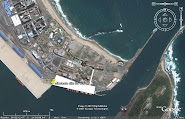Vetch's Pier plan faces rethink
July 19, 2007 Edition 1
Tony Carnie
THE controversial plan that will elbow out Durban's water-sports community from Vetch's Pier for a new yacht marina and commercial waterfront development has run into an obstacle.
The provincial Department of Environmental Affairs is unhappy with aspects of the marina plan and the mandatory environmental impact report lodged by the deve-lopers.
It has now insisted that a public meeting be held soon to discuss and clarify a new "compromise" plan negotiated between the eThekwini Metro and the Durban Point Deve-lopment Company.
The latest developments follow a series of objections from the city, watersport enthusiasts and members of the public over the perceived privatisation of a popular public beach.
Some of the central concerns raised by the provincial environment department include the likelihood of overcrowding at the beach, the legality of alienating a public amenity and the need to explain who will win and who will lose if the plan goes ahead.
According to a letter sent to the Durban Point Development Company spokesman Neels Brink, the provincial environment department's internal review task team had identified several "short- comings" and issues which required clarity.
Brink was not prepared to discuss what modifications were being considered when The Mercury spoke to him yesterday.
"When we go public everyone will see what is there . . . You are trying to pre-empt the legal public process," he responded when asked whether Durban Point Development Company had modified its original layout plans.
However, City Manager Michael Sutcliffe has confirmed that the city had asked the company to change certain aspects of the proposal and it is believed the deve-lopers were told to scale down the size of the yacht marina and to create a larger public beach area.
Sutcliffe said the eThekwini Metro Council supported the concept of a new small craft harbour, but the city's professional planning team did not agree with some of the developers' proposals.
From the perspective of urban design, the city wanted to see a "unique urban environment - not just a huge blob of concrete or a glorified shopping centre".
Sutcliffe believed the city had come up with a proposal, which was technically feasible.
Asked whether the proposed modifications would address the concerns of watersport clubs, which were worried about being "cooped up" in small premises, Sutcliffe said: "I think we are getting there . . . we were able to workshop a number of issues, but it's not going to satisfy everyone."
He suggested it was unrealistic to expect either a status quo situation or a maximisation of development. However, it appears that land ownership of the site may represent a significant legal stumbling block for the developers.
The Department of Environment Affairs and the Durban Paddleski Club have questioned who owns the land and the adjoining sea, and whether it is legal for the company to alienate it.
Sutcliffe said the ownership issue was still being discussed with Transnet Chief Executive Maria Ramos and Chief Operating Officer Louis van Niekerk. "It's not something we have resolved yet, but I'm hoping we will get a breakthrough."
In his letter to Brink and the environmental impact assessment project team, Malcolm Moses of the provincial Environment department said there was no proof or clarity on who owned the Vetch's site and whether the company was entitled to alienate this land if it was sold or leased.
Comment
Moses said his department had been informed that the final layout plans had undergone "several changes" and the public should be given an opportunity to comment on the changes.
He noted that the length of the beach at Vetch's would be reduced by nearly 100m when the harbour mouth was widened and uShaka beach had been created specifically to mitigate the loss of beach.
"Will the small craft harbour confine current users of Vetch's to a smaller area and will this result in the overcrowding of uShaka beach? Please provide a detailed response," wrote Moses.
The department also wanted clarity on whether adequate parking facilities would be provided and what would be done to address the fate of the water sports clubs and seine-netters.
Moses also raised concerns about a social impact assessment study conducted by the University of KwaZulu-Natal Centre for Environmental Management, noting that more information was needed to assess the distribution of benefits and costs of the affected people.
The department also expected clearer responses to the concerns raised by interested and affected groups, rather than just the deve-lopers' preferred options.
Wednesday, July 25, 2007
Subscribe to:
Post Comments (Atom)


No comments:
Post a Comment